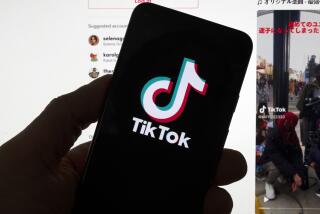Clubhouse chats are breached, raising concerns over security

- Share via
A week after popular audio chatroom app Clubhouse said it was taking steps to ensure user data couldn’t be stolen by malicious hackers or spies, at least one attacker has proved the platform’s live audio can be siphoned.
An unidentified user was able to stream Clubhouse audio feeds this weekend from “multiple rooms” into their own third-party website, said Reema Bahnasy, a spokeswoman for Clubhouse. Although the company says it’s “permanently banned” that particular user and installed new “safeguards” to prevent a repeat, researchers contend the platform may not be in a position to make such promises.
Users of the invitation-only iOS app should assume all conversations are being recorded, the Stanford Internet Observatory, which was first to publicly raise security concerns Feb. 13, said late Sunday. “Clubhouse cannot provide any privacy promises for conversations held anywhere around the world,” said Alex Stamos, director of Stanford Internet Observatory and Facebook Inc.’s former security chief.
Stamos and his team were also able to confirm that Clubhouse relies on a Shanghai start-up called Agora Inc. to handle much of its back-end operations. While Clubhouse is responsible for its user experience — such as adding new friends and finding rooms — the platform relies on the Chinese company to process its data traffic and audio production, he said.
Clubhouse’s dependence on Agora raises extensive privacy concerns, especially for Chinese citizens and dissidents under the impression their conversations are beyond the reach of state surveillance, Stamos said.
Agora said it couldn’t comment on Clubhouse’s security or privacy protocols and insisted it does not “store or share personally identifiable information” for any of its clients, of which Clubhouse is just one. “We are committed to making our products as secure as we can,” the company said.
Over the weekend, cybersecurity experts noticed that audio and metadata were being pulled from Clubhouse to another site. “A user set up a way to remotely share his login with the rest of the world,” said Robert Potter, chief executive of Internet 2.0 in Canberra, Australia. “The real problem was that folks thought these conversations were ever private.”
The culprit behind the weekend audio theft built their own system around the JavaScript tool kit used to compile the Clubhouse application. They effectively jury-rigged the platform, Stamos said. Stanford Internet Observatory said it didn’t determine the origin or identities of the attackers.
Although Clubhouse declined to explain what steps it took to prevent a similar breach, solutions may include preventing the use of third-party applications to access chatroom audio without actually entering a room or simply limiting the number of rooms a user can enter simultaneously, said Jack Cable, a Stanford Internet Observatory researcher.
A week ago, Stanford Internet Observatory released a report saying it observed metadata from a Clubhouse chatroom “being relayed to servers we believe to be hosted” in China. Agora’s obligations to China’s cybersecurity laws mean that it would be legally required to assist in locating audio should the government contend it jeopardized national security.
Clubhouse recently raised $100 million at a reported $1-billion valuation. Agora has soared more than 150% since mid-January. It is now worth close to $10 billion.
In early February, users of Clubhouse in China said they were unable to access the app after an explosion of discussions by mainland users on taboo topics from Taiwan to Xinjiang. For now, it appears that users can still access the app by using virtual private networks, one of the few ways people in mainland China can explore the internet beyond the Great Firewall.
More to Read
Inside the business of entertainment
The Wide Shot brings you news, analysis and insights on everything from streaming wars to production — and what it all means for the future.
You may occasionally receive promotional content from the Los Angeles Times.










